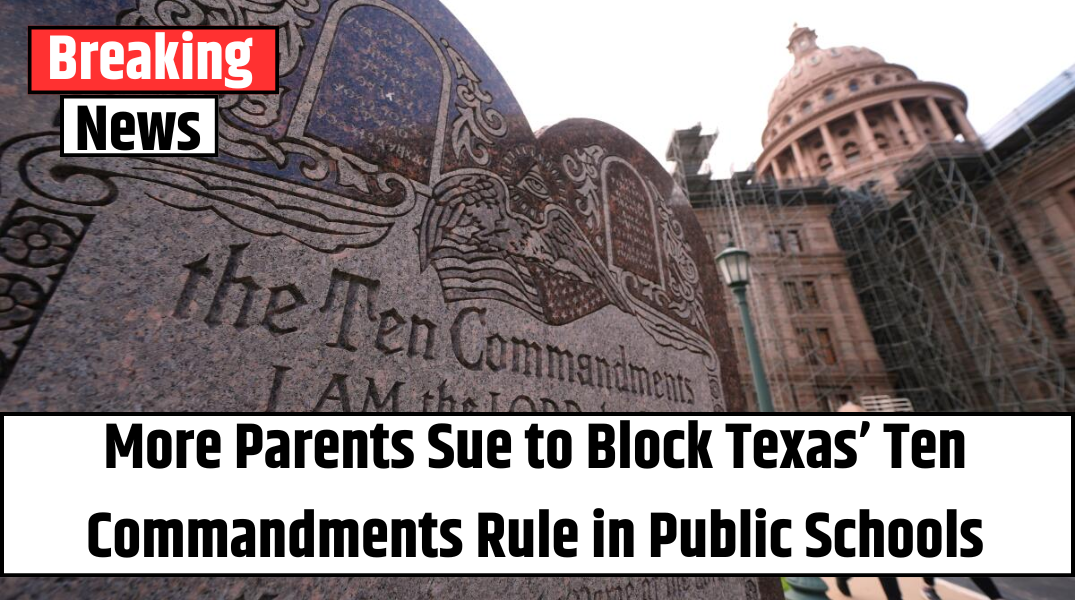More Parents Sue to Block Texas’ Ten Commandments Rule in Public Schools
A growing legal battle is unfolding over a controversial Texas law that requires public schools to display the Ten Commandments in every classroom. On Wednesday, a second lawsuit was filed by a group of sixteen parents—representing a range of religious and non-religious beliefs—challenging the constitutionality of the new mandate.
Filed in San Antonio federal court by the ACLU of Texas and the Freedom From Religion Foundation, the lawsuit targets several school districts, including those in Austin, Houston, Fort Bend, and Plano. This legal action follows a separate complaint filed last week in Dallas by a different set of parents who also object to the law.
A Law at the Center of Church-State Debate
Senate Bill 10, introduced by Sen. Phil King (R-Weatherford) and signed into law by Gov. Greg Abbott in June, requires all Texas public schools to post the Ten Commandments in a prominent location inside classrooms by September. The posters must be at least 16 by 20 inches in size and contain the full biblical text.
Supporters say the measure reflects the historical roots of the nation’s legal system and promotes moral values. Critics, however, view it as a direct assault on the constitutional separation of church and state, with some warning it could lead to divisive religious messaging in schools.
This move comes despite a recent ruling by the 5th U.S. Circuit Court of Appeals declaring a similar mandate in Louisiana unconstitutional, stating it infringed on students’ First Amendment rights.
Plaintiffs: Law Disrespects Religious Freedom and Parental Authority
Parents involved in the new lawsuit argue that the state has overstepped its boundaries. Among them is Griff Martin, a Baptist pastor and father, who criticized the law for interfering with religious autonomy.
“This law contradicts our Baptist belief that religion should be a personal choice, not dictated by the government,” Martin said.
The plaintiffs come from varied backgrounds, including Christian, Jewish, nonreligious, and interfaith households. They contend the requirement not only violates their religious freedom, but also undermines their role in guiding their children’s moral and spiritual education.
In the Dallas lawsuit, one Christian pastor said the state-endorsed display could alienate students who don’t follow the Ten Commandments, reinforcing the message that they don’t belong. Another plaintiff raised concerns that the biblical reference to adultery could spark age-inappropriate questions from young children.
One parent, Allison Fitzpatrick, said she worries her kids could feel excluded or punished for not observing commandments like Sabbath worship, despite that not being a practice in their household.
Also Read – Texas Family Faces $1,400 Bill for Measles Vaccine Needed to Protect Boy
Advocates Warn of Broader Religious Encroachment
Annie Laurie Gaylor, co-president of the Freedom From Religion Foundation, called the law a clear attempt by the state to impose a specific religious doctrine on schoolchildren.
“It’s not the government’s role to tell kids which god to believe in, how many gods to worship—or whether to believe in any god at all,” Gaylor said.
She added that the new law could pave the way for further religious impositions in public education, infringing on families’ rights to choose their beliefs freely.
School Districts Remain Cautious
Most school districts named in the suits have refrained from commenting publicly. A spokesperson for Dallas ISD declined to discuss ongoing litigation, while Lancaster ISD stated they were monitoring developments. The Texas Education Agency, which is a defendant in the earlier lawsuit but not the ACLU’s filing, has not released a statement.
DeSoto ISD, which serves around 6,000 students, issued a general statement affirming its dedication to inclusivity and legal compliance.
“The district remains committed to respecting the religious and cultural diversity of our students and families,” DeSoto ISD said. “We believe parents should lead their children’s personal and spiritual growth.”
What’s Next?
As both lawsuits make their way through the courts, they set the stage for a constitutional showdown that could impact religious expression in public schools across the nation. With challenges already underway, Texas’ Ten Commandments mandate may soon be tested in the higher courts—potentially reshaping how religion is handled in American classrooms for years to come.







